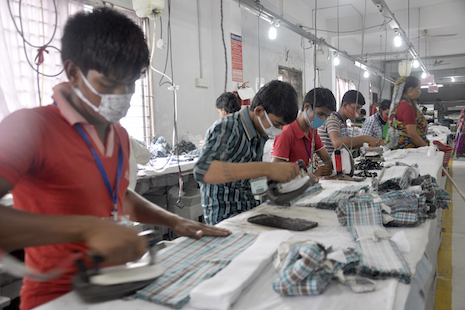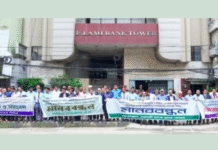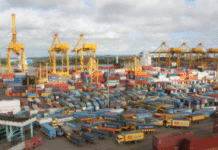Exclusion from US trade list reflects dire situation for workers, observers say

Bangladesh needs to do more to ensure labor rights in the country, says a Caritas official reacting to the U.S. keeping the country off its list of developing nations who enjoy special trade privileges.
“If Bangladesh can ensure labor rights, and regain the generalized system of preferences, the industry can make even more progress and the workers will benefit greatly,” says Caritas Dhaka regional director Ronjon F. Rozario.
The United States announced on Aug. 11 it was not reinstating Bangladesh to a list giving trade privileges to 122 developing countries. The generalized system of preferences scheme allows duty-free access for up to 5,000 products in the U.S. market.
The United States suspended this trade benefit for Bangladesh in June 2013, three months after the collapse of the Rana Plaza factory complex that killed 1,134 workers and injured several thousand.
This tragedy, one of the worst industrial disasters to hit Bangladesh, highlighted appalling safety problems in the country’s US$25-billion garment industry, the world’s second-largest after China’s.
“After the Rana Plaza collapse, many families of dead and injured victims didn’t get enough support and compensation for rehabilitation. It showed how helpless the workers are. Maybe the U.S. considered this when making its decision,” Rozario said.
Caritas, the Catholic Church’s social service arm, has been helping families of the dead and injured of the Rana Plaza tragedy. It has helped dozens of workers too traumatized to go back to the garment industry to start small businesses.
Babul Akhter, president of the Bangladesh Garment and Industrial Workers’ Federation, a leading trade union, agreed with the Caritas official.
The continuation of the trade suspension is a result of the government’s inadequate measures to ensure labor rights, he said.
“The U.S. revoked the generalized system of preferences because of gross violations of labor rights in Bangladesh’s garment industry, and it is still a big issue for millions of workers. Possibly, this is what contributed to the U.S. decision,” Akhter said.
Garment workers still face difficulty in forming trade unions due to a lack of cooperation from owners and government officials. They endure low wages and the withholding of earnings, and often face false charges if they protest and demand lawful rights, he added.
“There have been some changes since the Rana Plaza collapse, but more should have been done,” Akhter said.
Commerce Minister Tofael Ahmed disagreed.
“Bangladesh has made visible progress in reforming the garment industry after the Rana Plaza collapse by fulfilling the reform agenda put forth by the U.S. and international labor groups. Moreover, there has been no major accident in the industry in recent years,” he said Aug. 12.
Catholic businessman and garment factory owner Bilas B. Gomes said he is confused with the U.S. reaction. “If the European Union is satisfied with reforms and continues trade privileges for Bangladesh, it’s ridiculous when the U.S. government says we are still not eligible,” he said.
U.S. Ambassador to Bangladesh Marcia Bernicat confirmed on Aug. 11 that Washington’s decision was based on workplace safety and rights concerns.
Source: UCANews









